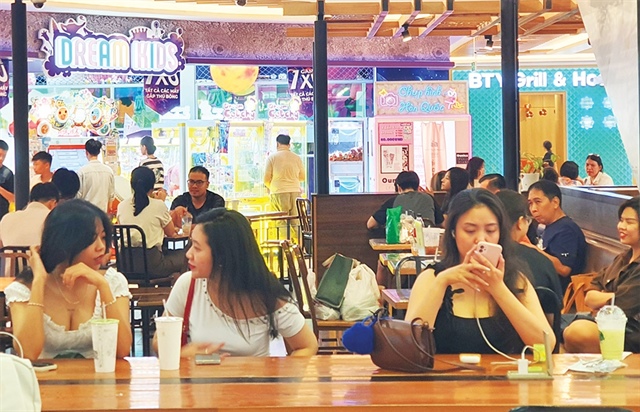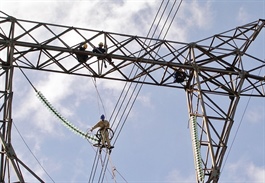F&B brands face long-term struggle
F&B brands face long-term struggle
A raft of food and beverage brands are shutting their doors amid a challenging economic environment.
In late September, Central Plaza Hotel announced the dissolution of a joint venture operating the Café Amazon chain in Vietnam. ORC Coffee Passion Group is the joint venture established in the country, in which Central Restaurants Group Vietnam, an indirect subsidiary of Central Plaza, owning a 40 per cent stake, and PTTOR International Holdings of Singapore holding the remainder.

Bigger cities in particular have seen F&B outlets shut down due to financial difficullties, photo Le Toan |
The dissolution is due to the highly competitive market conditions in Vietnam, which necessitated an adjustment of the company’s strategy and business objectives. As of August 31, Central Plaza’s carrying investment in the Vietnamese joint venture amounted to around $1.7 million.
The move marks the withdrawal of the Café Amazon chain after five years of expansion in Vietnam. The chain had operated a network of 12 outlets in the southern area, mainly in Ho Chi Minh City.
Last month, bakery brand Bready also announced its closure following two decades serving freshly baked bread in Ho Chi Minh City. “After 21 years of service, we would like to announce that the journey has come to an end,” the brand noted.
Bready was established by Tran Quang Vinh in 2004. When he visited Vietnam’s first foreign fast-food outlet, he was impressed by the professionalism and efficiency of the model. Bready was born as a modern, locally owned alternative to cater to the fast-paced lifestyle of residents in Ho Chi Minh City.
Another food and beverage (F&B) startup, Vua Cua, ceased operations in March. Founded in 2016 by Doan Thi Anh Thu, Vua Cua was a restaurant chain specialising in crab dishes. The startup had secured funding from different investors and funds, but failed to maintain operation due to a lack of resources.
According to the Vietnam F&B Market Report for the first half of 2025, released on October 10 by iPOS.vn in collaboration with Nestlé Vietnam, the country counted just under 300,000 active F&B outlets, down 7.1 per cent from 2024.
Steep contractions occurred in Hanoi and Ho Chi Minh City, both recording declines of more than 11 per cent. This wave exceeds that of mid-2024, when about 30,000 outlets closed, equivalent to 4 per cent.
Taku Tanaka, CEO and founder of Kamereo, said, “The main reason these businesses closed is simple: they weren’t making money. In many cases, revenues couldn’t keep up with rising costs, and eventually, the cash ran out. However, deeper issues lie beneath this, including weak operational efficiency, poor cost control, high rental expenses, and insufficient capital to sustain the business long enough to reach profitability.”
Meanwhile, competition in Vietnam’s F&B sector has intensified as more well-funded international brands enter the market. Many newcomers are prepared to operate at a loss for a period, viewing it as a strategic investment to build long-term presence and brand equity. This makes it difficult for existing brands to compete on equal footing.
“Brands must be thoughtful before jumping into the F&B business. Catching a trend may look easy, but many trends fade as quickly as they rise,” Tanaka suggested. “Long-term success requires genuine operational excellence and the ability to deliver consistent value to customers. Don’t start with a large, high-rent location that locks you into fixed costs you can’t easily reduce.”
Building traction and brand awareness takes time, so approach the business with patience and a long-term mindset, he added.
Ralf Matthaes, managing director of IFM Research, said that consumers are staying at home more. “Add to that economically, there is still a high level of uncertainty, and consumers are practicing cautious spending. The markets in Hanoi and Ho Chi Minh City are already saturated with F&B brands, and consumers are more apt to stay with long-established existing brands,” Matthaes said.
Moreover, Vietnam’s F&B market has a history of overspending on outlets and underspending on marketing. “The product must fit the wallets of Vietnamese consumers. Without relevant offers and pricing, they are doomed to fail,” Matthaes added. “Too often in Vietnam, F&B startups only rely on Facebook and lack any clarity of marketing reach. Without that, failure is imminent.”
- 09:00 20/10/2025























